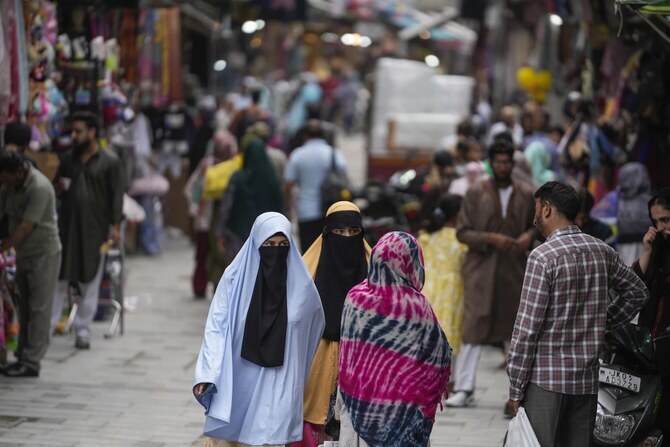NEW DELHI: Nasir Khuehami has never participated in a mainstream election in Jammu and Kashmir, but he is currently campaigning to mobilize others to take part in next week’s vote — the first in a decade and taking place in a new political setting after Prime Minister Narendra Modi’s government stripped the region of its autonomy in 2019.
Polling will be held in stages between Sept.18 and Oct. 1 to elect a local assembly — a truncated government with a chief minister, who will serve as the region’s top official, and a council of ministers — instead of remaining under the direct rule of New Delhi.
The result will be announced on Oct. 8.
“I don’t care which regional party wins, what matters is that the people of Kashmir should have someone who is their own,” Khuehami told Arab News.
The 26-year-old national convenor of the Jammu and Kashmir Students’ Association is visiting different districts of the valley to mobilize students ahead of the vote.
“For the last 10 years there have been no elections in Jammu and Kashmir. In the last five years, after the abrogation of special status, even democracy was suspended, and it is bureaucrats who run the region. There has been no accountability,” he said.
“When we compare these bureaucrats with our own elected leaders, we find that our representatives are accountable, they listen to us, and they understand us ... This accessibility we miss now.”
Kashmir has been without a local government since 2018 when Modi’s ruling Bharatiya Janata Party brought down a coalition government, forcing the assembly to dissolve. A year later, Modi’s government abrogated Article 370 of the Constitution, which granted the region its semi-autonomy, and downgraded it to a federally controlled territory.
Indian officials have repeatedly said that the move was aimed at tackling separatism and bringing economic development to the region, but Khuehami said people on the ground have yet to witness it.
“All the development agenda has fallen flat,” he said. “How many development activities took place, how many universities were created, how many exams were canceled? This is the reality.” He added that he was hopeful that, after the election, “things might improve.”
Ummar Jamal, a 23-year-old law student from the University of Kashmir was also looking forward to the vote, even though the powers of its elected administration will be limited, as the region is now a union territory.
“There was a sense of despondency after the abrogation of Article 370. I believe people are celebrating the election process (now). They are enjoying the celebration of democracy. I hope that after elections our representatives will be better placed to address our issues,” he said.
“Unemployment is very high. Why are the youth coming out in large numbers to campaign and vote? Somehow, they feel the public representatives may get these unemployment issues addressed.”
Indian-controlled Jammu and Kashmir is part of the larger Kashmiri territory, which has been the subject of international dispute since the 1947 partition of the Indian subcontinent into Hindu-majority India and Muslim-majority Pakistan.
Both countries claim Kashmir in full and rule in part. Indian-controlled Kashmir has, for decades, witnessed outbreaks of separatist insurgencies to resist control from the government in New Delhi.
The two main regional parties — the National Conference and the People’s Democratic Party — are going to challenge Modi’s Bharatiya Janata Party. The Congress, India’s main opposition party, is in alliance with the NC.
“There is a strong sense of anti-BJP sentiment because people feel that the BJP is trying to alter the regional identity. Youngsters are supporting the regional parties like NC and PDP which are speaking the language of the people and expressing their aspirations,” said Tariq Mir, 33, a PR manager and writer based in Srinagar, Kashmir’s largest city.
“The main issue is the question of the Kashmiri identity ... People want a peaceful life with dignity.”
But they also seek new prospects, as unemployment in the region stands at around 18 percent — nearly double India’s average.
Aqib Manzoor, a law student at Central University of Kashmir, said that while many hope for the restoration of the region’s statehood, the creation of jobs in the private sector, tackling corruption, and giving them more freedom of expression are also key issues.
“Though hopes remain very high, time will tell whether these issues and concerns of youngsters will be addressed, or just remain unaddressed like in the past, when the state assembly had enough powers to bring real changes on the ground,” he said.
“The center and all parties should prepare to seize the new opportunity for the future of a prosperous state that addresses the concerns and aspirations of (those who are) the future of the nation.”
























